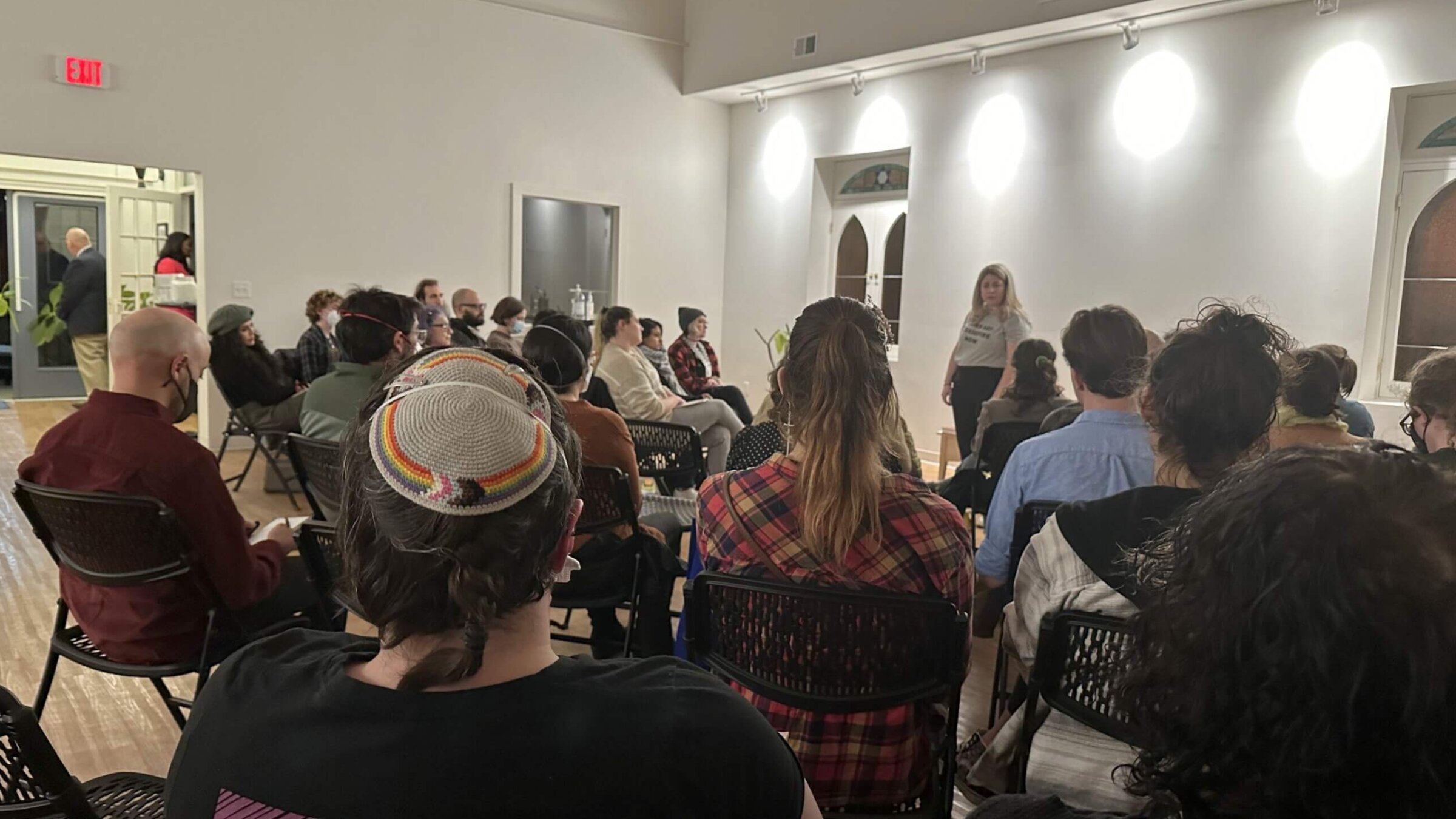A Jewish day school hired a former ceasefire activist. Then came the backlash.
The head of Mirowitz Jewish Community School said ‘feedback from many community members’ led to decision

A “Ceasefire Shabbat” service in St. Louis on Nov. 10.
Tasha Kaminsky figured her politics might be a concern for the Jewish day school she was applying to work for. So on her first call with a recruiter, she says, she brought it up.
“I was like, ‘Hey, just so you know, I’ve been very vocal about wanting a ceasefire,’” Kaminsky said in an interview with the Forward. “I know that that could be an obstacle, and I understand if I’m not a good candidate.’”
Kaminsky, a nonprofit development professional, started a group last November called Hineni that represents Jewish St. Louisans who support a ceasefire. She was no longer active with the group, but in the war’s early months she had been its public face.
In subsequent job interviews, Kaminsky said, administrators said that her past activism wouldn’t be an issue, and on July 2, she signed a job offer. Saul Mirowitz Jewish Community School, a pluralistic elementary and middle school in St. Louis, introduced her as its new director of development in a July 9 email to parents and staff.
But the school rescinded its offer two days later, following what Kaminsky says was a campaign to oust her over her views on Israel. She still doesn’t know who was behind it.
“I was ecstatic to serve a beautiful, pluralistic and inclusive Jewish community,” Kaminsky said. “They rescinded the offer because they were unprepared to stand behind me in their decision to hire me due to bullying, rumors, gossip and cruelty.”
Head of school Raquel Scharf-Anderson emailed faculty and parents July 11 that Mirowitz had reopened its search for the position “after receiving valuable feedback from many community members.”
In a statement to the Forward, Scharf-Anderson said, “I followed the recommendation of the board that based on community response, the offer should be rescinded.”
Criticism of Israel has been met with increasing hostility in American Jewish spaces since Oct. 7. But two longtime community leaders said the trend feels especially acute in St. Louis, where voicing any sort of opposition to Israeli policy often leads to bullying and calls for professional consequences.
Leading the movement
Kaminsky, who helped found two local Jewish nonprofits and previously worked for the ADL’s St. Louis chapter, said she started Hineni because she was motivated by pikuach nefesh, the Jewish imperative to save a life.
With the Israel-Hamas war raging in November, Kaminsky helped organize ceasefire-themed Shabbat and Hanukkah services, and was a fixture at local ceasefire protests. (She said she had also attended or organized numerous events for the hostages and victims of Hamas’ Oct. 7 attack, including a prayer vigil and a shloshim event.)
A Nov. 8 Hineni Instagram post advertising the Ceasefire Shabbat said, “You do not have to choose between your Judaism and Palestinian liberation.” It was later edited to read, “You don’t have to choose between being in solidarity with Palestinians and being a part of the Jewish community.”
Kaminsky, much of whose extended family lives in Israel, said she does not affiliate “one way or another” when it comes to Zionism. She said she did not have any problem working at a school that would fly an Israeli flag or celebrate Yom Ha’Atzmaut. Nor did she see raising money for a school Israel trip as problematic — she has led teen trips there herself.
In a 2022 article Kaminsky wrote anonymously for the publication +972 that later appeared elsewhere with her byline, titled, “The Anti-Defamation League fails to fight racism,” she wrote that being an anti-Zionist precluded her from advancement in the organization.
Asked about the statement that she was anti-Zionist, Kaminsky said, “I have changed my mind about that, especially in the wake of Oct. 7 and the way that discourse has gone. I no longer find that word to mean anything.”
She said she quit Hineni and retreated from public activism in December after Missouri Rep. Sarah Unsicker made her the subject of a bizarre antisemitic conspiracy involving Kaminsky’s past work with the ADL. The group is no longer active.
In 2020, Kaminsky raised eyebrows when she tweeted that she would pay anyone who doxxed a particular Twitter user, whom Kaminsky claimed was transphobic and “bullying a lot of Jewish accounts.” (Kaminsky told the Forward she realized the tweets were a bad idea and deleted them almost immediately, and that the incident did not come up in conversations with the school.)

Faceless backlash
It was unclear who raised the concerns about Kaminsky’s hiring. But she realized trouble was brewing when Scharf-Anderson called within hours of the email announcing her hire, asking Kaminsky to address a letter to the board explaining her views on Israel.
In a letter she sent that night, she wrote that she believed Israel “has as much a right to exist as any other country,” that Israelis “should not be removed or exiled from their historic homeland,” and that she believed in “security, dignity, justice and freedom” for Israelis and Palestinians alike. She also noted her extensive family connections to Israel — both her parents’ families live there, and her husband — Elad Gross, who is running for Missouri attorney general — was born to Israeli parents.
“I want to live in a world where my favorite professor from Brandeis University, Dr. Michael Feige, was never murdered by terrorists while drinking coffee on Dizengoff,” she wrote. “I want to live in a world where my family friend, Vivian Silver, was not murdered on October 7.” She concluded with an open invitation for coffee to anyone who wanted to go deeper.
She didn’t get any bites — and the letter apparently did little to placate her detractors.
Kaminsky said the next day she received another call from Scharf-Anderson, who said she had received an anonymous tip that someone had a restraining order against Kaminsky. Kaminsky explained to the head of school that after she had escaped a domestic violence situation, her abuser had used a restraining order to keep her from speaking out; since she had already moved out of state, she chose not to fight it. (Court records show that the man also sued her for defamation and lost.)
Then Scharf-Anderson brought up pictures of her at protests that seemed to have come from Kaminsky’s private Instagram account. “I said, ‘Yeah, I’m friends with Palestinians,’” she said. “I hang out with Palestinians. I’m not scared of being around Palestinians or Palestinian flags.” But also, she said, she had attended many events for the Israeli hostages, and organized a Jewish prayer vigil shortly after Oct. 7. “For every photo of me with Palestinians, there are far more of me with Jews.”
She said Scharf-Anderson told her she would meet with the board that night. Informing Kaminsky of the board’s decision to rescind the offer the next morning, Scharf-Anderson asked if she would like to send a letter announcing she had withdrawn of her own accord. Kaminsky declined.
Doing so might have kept things quiet, she said, but it would not address the bigger picture: “Many St. Louis Jews do not feel comfortable, safe or welcome in their own community because their opinions about Israel do not conform.”
The president of the school’s board, Sara Lander, said that while “no single issue is a disqualifier” when it comes to Israel, “the needs of each position vary.”
“While we can’t comment on the specifics of personnel matters, Saul Mirowitz Jewish Community School is committed to ensuring the success of all new employees,” Lander added. “If we determine that success is not feasible, we owe it to both the applicant and the school to communicate that promptly and change course.”
An alarming trend
Kaminsky’s story was of a piece with Israel-related backlash other Jewish community leaders say they’ve experienced in St. Louis in recent years.
Maharat Rori Picker Neiss, who in April left her job as executive director of St. Louis’ Jewish Community Relations Council, said Israel supporters engaged in intimidation tactics against her during her tenure, which factored in her decision to leave the post.
She said the campaign against her included made-up rumors about her fourth-grader criticizing Israel in school being forwarded to the head of the St. Louis Jewish Federation. (The Federation declined to comment for this story.)
Whereas prior to Oct. 7, she said, Jewish institutions tended to weather those complaints, now they tend to cave to them, emboldening those who try to silence dissenting voices.
“Whether it’s fear of being harassed or losing their job, or actually facing harassment or actually losing their job, the definition of what’s acceptable, specifically around Israel, is becoming narrower and narrower,” said Picker Neiss, who moved to Boston for a job with the Jewish Council of Public Affairs.
Rabbi Daniel Bogard, spiritual leader of Central Reform Congregation, a synagogue in St. Louis, recalled the outrage around a 2019 event he moderated with Breaking The Silence, an organization of IDF veterans critical of Israel’s occupation of the West Bank.
“There were letter-writing campaigns, callouts, organizing,” Bogard said. “It really felt like there were voices trying to stifle and to pretend like this isn’t what Jews think or feel.”
Bogard, a Mirowitz parent, said he was “incredibly upset” about what happened with Kaminsky, but that he thought the issue was much bigger than the school.
“It reflects a terrible, broader dynamic that we are seeing throughout the Jewish community, and certainly in St. Louis,” he said, “where people are trying to draw thick lines and exclude committed members of our Jewish community because they don’t meet — or even sometimes just they don’t appear to meet the inappropriate and arbitrary standards certain people set around what constitutes being pro Israel.”
Kaminsky, who plans to return to her work as a development consultant for nonprofits, said she did not begrudge the school, Scharf-Anderson or Lander for their decisions. But she called the people who called for her job without revealing themselves “cowardly.”
“I understand that they feel differently than me, and I’m comfortable with that,” she said. “They don’t need to feel the same way as I do. They don’t need to feel the same way as I do for us to even have a relationship. All I need them to do is acknowledge my humanity and acknowledge that there’s nothing wanton or evil about wanting a ceasefire. It’s not a fireable offense.”















